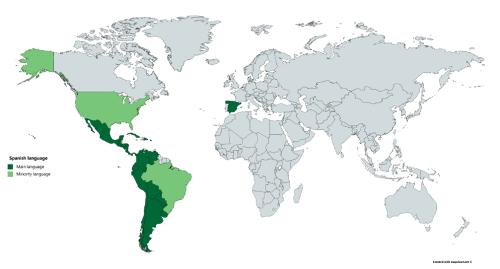URUGUAY
Language

Language
Cities in URUGUAY
| Montevideo |
Language
The Spanish spoken in Uruguay mainly descends from Castilian and Andalusian. Spaniards who wanted to settle in the New World in the 16th century had to do so through the province of Castile in Central Spain. Then they were sent to Andalusia or Seville because from there the ships left for South America. This could take up to a year and because of that they also learned to speak and understand Andalusian. By the time they arrived in South America, they all spoke about the same language. Over time, this language has changed a bit, of course, but is still very much like the Spanish spoken in Spain. The differences are in the pronunciation and the choice of words. Some words that have not been used in Spain for a long time are still used in South America.
 Spanish language map of the worldPhoto: Simonsyo CC 4.0 International no changes made
Spanish language map of the worldPhoto: Simonsyo CC 4.0 International no changes made
Spanish is therefore the official language in Uruguay and is spoken and understood by practically everyone. In the north, along the Brazilian border, most people speak both Spanish and Portuguese or they speak “fronterizo”, a mixture of Spanish and Portuguese. Uruguay’s location between Argentina and Brazil, and the fact that Uruguay has been a province of Brazil for a while, are related to this. The Montevideo dialect, the “porteño”, is practically the same as that of Buenos Aires in Argentina. Several words of the “lunfardo”, a working-class dialect, have been incorporated into Uruguayan.
Cocoliche, a type of Spanish spoken by Italian immigrants, and the Gaucho dialect of the cowboys of Uruguay, are extinct languages that are no longer spoken by anyone. They are only sometimes used in poetry and theater. For example, the word "chau" has been adopted from the Italians, from the Italian "ciao". For a period in the 18th and 19th centuries, Montevideo was an important port for the slave trade. Words of African slaves have also been recorded in Uruguayan.
The Spanish of the La Plata countries, including Uruguay, the Español Rioplatense, differs markedly in some aspects from the rest of Latin America. Most notable is the use of the pronoun “fox” instead of “tú” for “you”, and the pronunciation of the “Ll” (eg Llanos) as “zh” instead of “y”. The name Uruguay comes from Guaraní and means “the river where the birds live”.
Sources
Bernhardson, W. / Argentina, Uruguay & Paraguay
Lonely Planet
Haitsma, M. / Uruguay: een landenmap
Novib
Jermyn, L. / Uruguay
Marshall Cavendish
CIA - World Factbook
BBC - Country Profiles
Copyright: Team The World of Info